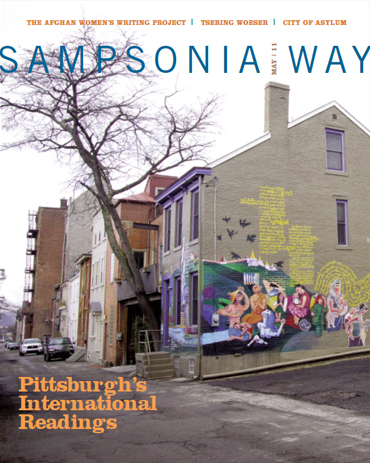Readings at City of Asylum Pittsburgh
by Elizabeth Hoover / May 11, 2011 / No comments
At a reading hosted by City of Asylum/Pittsburgh last November, Iranian novelist Shahriar Mandanipour read an excerpt from his most recent novel, Censoring an Iranian Love Story. In the excerpt, a blind film censor listens to Dances with Wolves while a team of film experts describe what is happening on screen. They all agree that the footage must be censored, but they wildly disagree about which scenes to cut and how the film should be changed when dubbed into Farsi. The censors struggle to replace a wedding scene and eliminate any implication that the characters had a romantic relationship. Finally, they invent a Native American ritual in which long-lost siblings celebrate their reunification.
The audience couldn’t help but laugh at the outlandish premise, despite the seriousness of political repression in Iran. But creating that mix of seriousness and laughter is what Mandanipour set out to do; he announced at the beginning of his reading that he wanted to use sadness for ironic purpose. In his remarks, he also described the dire situation in Iran where students and activists languish in solitary confinement and every day Iranians await the news of another execution. The import of Mandanipour’s remarks lingered even amid the laughter of the audience.
Perhaps “audience” isn’t exactly the right word for this group of people gathered in the living room of Diane Samuels and Henry Reese, the founders of COA/P, a location Mandanipour described as a “cozy, serious, literary place.” Because the readings are so intimate and encourage such lively discussions, the term “guests” or “participants” is more apt.
Samuels and Reese have been hosting salon-style readings in their home since 2007. Samuels said they were inspired by the success of COA/P’s Jazz Poetry Concerts, an annual event that they started in 2005. Now approximately 700 people attend the outdoor reading and concert each year.
“If Pittsburgh weather were more gentle, we could present outdoor readings year round in the same spirit as Jazz Poetry,” Samuels said, adding they want to provide readings that are “free, casual, and non-institutional.”
Because they didn’t have other facilities besides the houses used for COA/P’s writers’ residences, Reese and Samuels opened their own home. Having readings in their house seemed like a natural choice to Samuels because “City of Asylum is all about hospitality.” She said that some of the regular attendees have become “acquaintances and friends” and hosting the readings helped her get to know her neighbors better.

Brenda Cardenas, Horacio Castellanos Moya, Beverly Perez Rego, Russell Banks
The first salon-style reading in their home was with writer-in-residence Horacio Castellanos Moya. They announced it via e-mail and asked people to RSVP. By the next day, all 45 spots were filled. They scheduled a second reading for the following month for those who didn’t it make it on the list for the first. Castellanos Moya was born in Honduras and lived in El Salvador before coming to Pittsburgh in 2006. He read from Senselessness, a novel in the voice of an increasingly paranoid man hired to edit the horrific testimonies of people who survived a mass killing in an unnamed Latin American country. This was Castellanos Moya’s first novel translated into English.
Since that first reading they have hosted an additional 19, and each one fills up almost immediately. “As soon as I get the e-mail, I reply,” said Adel Fougnies, a retired reading specialist and long-time Northside resident.
Fougnies attends every reading she can. “There is something raw and authentic about hearing the words in the author’s voice,” she said. Some of the authors have included Vijay Nair of India, Jim Powell of England, Glaydah Namukasa of Uganda, and Marius Ivaškevičius of Lithuania. There have also been North American authors such as George Packer, Russell Banks, Richard Wiley and Northsider Hilary Masters, as well as translators reading from poems and novels they have translated.

Shariar Mandanipour, Khet Mar, George Packer, Maxine Case
Samuels said she watches the guests “tune into the accents of the international writers reading in English. In the beginning, people are leaning forward to hear, but then something clicks and they relax. The accents are quite beautiful, another kind of music.”
Don Staricka, who moved from Los Angeles to Homestead, said he especially enjoyed hearing Venezuelan poet Beverly Pérez Rego read in Spanish this January. Compared to other readings he finds the events at COA/P “more civilized; people sit in chairs, there’s no smoking, no sound of a cappuccino maker.” He added that he is “astounded” that the readings are free. He was about to continue, but stopped himself. “I don’t want to inspire people to compete for a seat,” he quipped.
Northsider Sheila Carter-Jones, a poet and retired school teacher, has been coming to readings for a year now to “listen to writers share their craft.” She takes notes during the readings, which sometimes inspire her to create her own poems. “It’s a world eye on creativity,” she added. “These readings bring part of the world you might not otherwise be aware of.” She especially liked hearing Iranian author Shahriar Mandanipour, but by the time she got to the book table his books were sold out. He signed her notebook for her instead. COA/P subsequently arranged for Mandanipour to sign books for all those who were unable to get them at the reading.
Before the readings, there is usually a reception catered by Kate Romane of Flying Biscotti. After the reading, the author chats one-on-one with interested guests over locally made desserts like macaroons and biscotti. Samuels said guests linger until around 9:00. Maxine Case, a South African author who read last February, remembered her reading fondly. “Some readings you want to slink away from and others you want to stay and chat—this was definitely the latter!” she remarked.
“It was great to read in such a creative and intimate space…I was able to relax and build a rapport with the attendants,” Case added. Samuels also thinks the intimacy helps the guests connect with the authors and allows for lively discussions during the question-and-answer session. She remembered when the Chinese author Er Tai Gao read in November 2009, someone asked him what the situation is like in China. He compared it to 1941 Germany. “This kind of comment gives a chilling perspective on what is happening in the world right now,” Samuels said.
Current COA/P writer-in-residence Khet Mar had the opportunity to talk about the situation in her home country of Burma on March 3th. She read with poets Michelle Gil-Montero and Román Antopolsky who have translated her work into both English and Spanish. Within a day of the announcement, the 65 available slots had filled up. With this reading, they also had a hefty waiting list.
Khet Mar arrived in Pittsburgh in March 2009 and has enjoyed attending readings on Sampsonia Way. She said that the participants are “like a family” because they get to know one another. The readings have also provided an opportunity for her to meet and talk with international writers, a rare instance in Burma. “I lived in Burma my whole life and met two international writers there,” she said. “I can’t count how many I have met since I have come here.”
As an example she cited Akhil Sharma, a fiction writer who was born in India and migrated to the United States as a child. In April 2010, she talked with him about their respective homelands. “We are neighbors; India is next door to Burma,” she explained. “Having a conversation like that is impossible in Burma.” Indeed, readings of any kind are rare in Burma.
“The readings at COA/P are windows through which you can see the rest of the world,” Khet Mar said. “I wish my people could have the same experience.”





